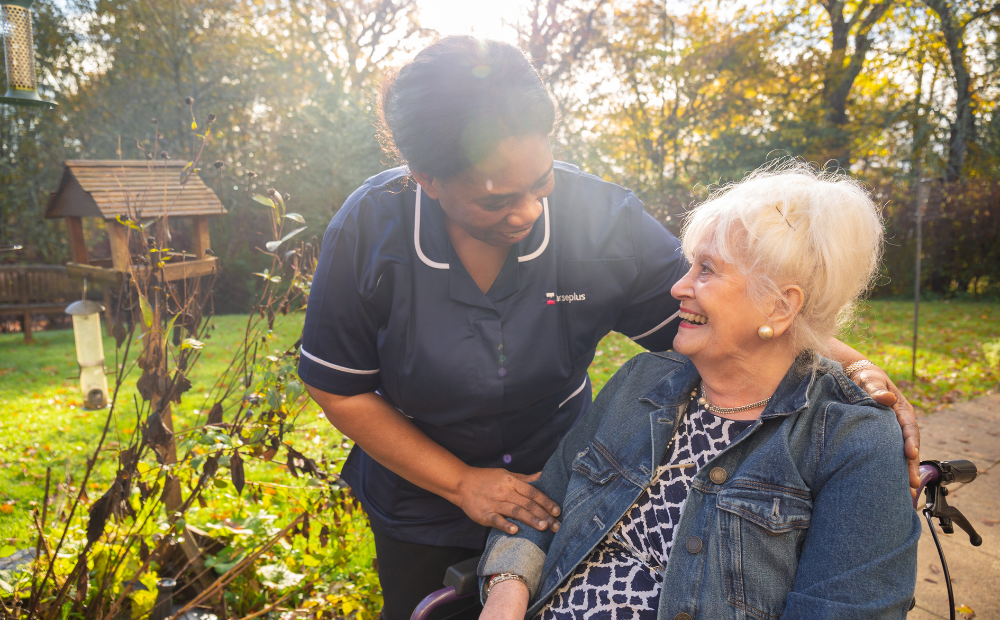What is Person Centered Care?
A Comprehensive Guide for UK Healthcare Providers and Service Users.
Person centered care (PCC) has become a vital pillar of effective, compassionate, and legally required service delivery in UK healthcare. This approach puts the spotlight on each individual's unique needs, preferences, and values, ensuring care is customised to the person rather than adhering to a one-size-fits-all model.
Understanding Person Centered Care

We believe person centered care means putting individuals at the heart of all healthcare decisions. We recognise each unique person's needs and respect their choices by involving them in their care planning as much as possible. At Nurseplus, our staff are trained not only to support and treat medical conditions but also to care for the emotional, social, and psychological needs of the people in our care.
According to the Health Foundation, person centered care encompasses four key principles:
Dignity, compassion, and respect
Coordinated care, support, or treatment
Personalised care, support, or treatment
Support to develop strengths and abilities
These principles are the building blocks we use at Nurseplus to ensure that the care we deliver is holistic and responsive to individual needs. Building our care practices around these principles has ultimately led to better health outcomes and patient satisfaction.
Legal Framework Supporting Person Centered Care in the UK
It is so important that all care providers support making person centered care a reality in the UK. Thankfully, there are specific laws that can help us shape this approach and make sure everything we do is focused on those who need us.
Care Act 2014: Mandates local authorities to promote individual well-being and involve individuals in their care planning and assessment processes.
Health and Social Care Act 2012: Requires Clinical Commissioning Groups to promote the involvement of each patient in decisions about their care.
Mental Capacity Act 2005: Provides a framework for making decisions on behalf of individuals who cannot make decisions themselves, ensuring their rights and preferences are respected.
Care Quality Commission (CQC) Regulation 9: Specifies that care must be appropriate, meet individuals' needs, and reflect their preferences.
Using these laws, we can collectively ensure that person centered care is not just considered "best practice" but a legal requirement in our healthcare system.
The Benefits of Person Centered Care

At Nurseplus, person centered care is at the heart of everything we do, it's far more than just checking a box. We believe in the immeasurable benefits it brings for our dedicated care professionals, trusted care providers, and most importantly, the individuals we proudly serve.
Here's what we've found by adopting a person centered approach to care:
Improved Health Outcomes: Tailoring care to individual needs leads to better management of chronic conditions and overall health.
Enhanced Patient Satisfaction: Patients feel valued and heard, leading to increased trust and satisfaction with care services.
Reduced Hospital Admissions: Personalised care plans can prevent unnecessary hospital visits by addressing issues proactively
Empowered Patients: Involving individuals in their care decisions fosters autonomy and encourages active participation in their health management.
Our caregivers have reported overall greater job satisfaction by embracing a person centered care approach as they feel they experience more meaningful interactions in their work and find this leads to positive patient outcomes.
How We Apply Person Centered Care in Practice
Evidence points to the great benefits person centered care can bring to care professionals, providers, and those we care for. But how do we go about applying these practices to real-life care environments?
Engage in Active Listening: Try to focus on understanding the concerns, preferences, and values of the people you care for.
Collaborate on Care Plans: Be sure to involve individuals in developing and reviewing their care strategies where possible.
Provide Clear Information: Ensure individuals have access to understandable information, allowing them to make informed decisions.
Respect Individual Choices: Honour the decisions of those in your care, even when they differ from recommendations, provided they are informed and aren't detrimental to emotional or physical health.
Through further learning and continuous professional development, our care staff are well-versed in communication and empathy skills, which are essential for the success of any person centered approach to care.
Person Centered Care in Action: Recent Developments
Recent initiatives in the UK have highlighted the benefits of applying a practical approach to person centered care, such as the integrated care model from the Jean Bishop Integrated Care Centre in Hull. By offering comprehensive assessments for older adults, addressing both physical and emotional well-being, person centered care has led to significant reductions in emergency visits and hospital stays.
This is just one example that demonstrates the tangible benefits that person centered approaches can have in enhancing patient care and optimising healthcare resources.
What is the Future of Person Centered Care

We would like person centered care to be considered as a fundamental aspect of modern healthcare in the UK, and bring the importance of tailoring care to individual care needs and preferences into sharp focus. Legislation is in place to support care providers as we continue to improve patient outcomes, build a more compassionate, effective, and efficient healthcare system in the UK.
At Nurseplus, we are committed to delivering person centered care across all our services and ensuring that every individual receives the respect, attention, and personalised support they deserve. If you require staff support from care professionals who work with a person centered care approach, you can reach out to your local branch or book staff with Nurseplus online.
Posted on June 09, 2025 by Nurseplus
